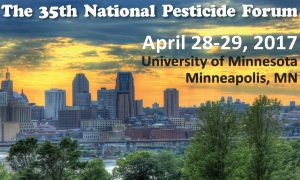09
Dec
Healthy Hives, Healthy Lives, Healthy Lands Forum Set for Minneapolis, MN, April 28-29, 2017
(Beyond Pesticides, December 9, 2016) Save the Date! Beyond Pesticides is pleased to announce the 35th National Pesticide Forum, Healthy Hives, Healthy Lives, Lands: Ecological and Organic Strategies for Regeneration, which will be held April 28-29, 2017 at the University of Minnesota, Minneapolis, MN. Some of the lineup of the keynote speakers for the upcoming forum include: Liz Carlisle, author of Lentil Underground; Don Huber, PhD, professor emeritus of plant pathology and glyphosate expert, Purdue University; and Jim Riddle, organic farmer and former chair of the USDA National Organic Standards Board.
The 2017 Forum is convened by Beyond Pesticides and Organic Consumers Association. We are collaborating with local groups, such as Pollinator Friendly Alliance, Giving Tree Gardens, Humming for Bees, Kids for Saving Earth, Blue Fruit Farm, Students for Sustainability, Birchwood Cafe, Seward Community Co-op and Pesticide Action Network North America (PANNA). The Forum offers a unique opportunity during a critical time in our nation’s history to chart a course that upholds principles and values, policies and practices, that protect health and the environment. The Forum delves into key issues of the day, such as pollinator decline, a problem linked to pesticide-intensive landscape and agricultural land management, and genetic engineered crops, whose production elevates pesticide dependency on hazardous chemicals and induces pest resistance. The Forum brings together speakers on the latest science on pesticides, from neonicotinoids to glyphosate, contrasted with practitioners utilizing organic management practices in agriculture, parks, athletic fields, and rangeland. In sum, the Forum seeks to help hone public understanding of the hazards of pesticides and the emerging science on adverse effects, while delving into local policy changes that are driving pesticide bans and incentivizing ecological and regenerative practices. The Forum includes a broad range of speakers and collaborators, and will provide an opportunity for grassroots advocates, scientists, policy makers, and land managers to discuss effective strategies and practices that work collectively for a sustainable future.
Register Today
Reserve your spot at the 2017 Forum and get the Early Bird Discount rate ($5 off). As an Early Bird buyer, you can get a general rate for $40, a student rate for $20, or a business rate for $170. Scholarships are also available. All ticket price rates include organic meals: on Friday, organic beer, wine, and hors d’oeuvre; on Saturday, organic breakfast, lunch, and dinner, plus organic beer and wine at the evening reception. For more details about registration, click here.
Featured Speakers (preliminary list)
Liz Carlisle is the author of Lentil Underground, which chronicles the sustainable agriculture movement in her home state of Montana. Carlisle is a Lecturer in the School of Earth, Energy, and Environmental Sciences at Stanford University, where she teaches courses on food and agriculture, sustainability transition, and environmental communication. She holds a Ph.D. in Geography from UC Berkeley and she formerly served as Legislative Correspondent for Agriculture and Natural Resources in the Office of U.S. Senator Jon Tester. Recognized for her academic writing with the Elsevier Atlas Award, which honors research with social impact, Liz has also published numerous pieces for general audience readers, in the New York Times, Los Angeles Times, Business Insider, and Stanford Social Innovation Review.
Don Huber, PhD is Professor Emeritus of Plant Pathology at Purdue University, holds B.S. and M.S. degrees from the University of Idaho, and a Ph.D. from Michigan State University. He was Cereal Pathologist at the University of Idaho for 8 years before joining the Department of Botany & Plant Pathology at Purdue University in 1971. His agricultural research over 55 years has focused on the epidemiology and control of soilborne plant pathogens with emphasis on microbial ecology, cultural and biological controls, nutrient-disease interactions, pesticide-disease interactions, physiology of host-parasite relationships and techniques for rapid microbial identification. Dr. Huber is past Chairman of the USDA-APS National Plant Disease Recovery System; a member of the US Threat Pathogens Committee; former member of the Advisory Board for the Office of Technology Assessment, U.S. Congress; and Office of the Surgeon General OTSG) Global Epidemiology Working Group. He is author or co-author of over 300 journal articles, Experiment Station Bulletins, book chapters and review articles; three books, and 84 special invited publications and an active scientific reviewer; consultant to academia, industry, and government; and international research cooperator. His work on glyphosate, raising issues of numerous health effects, enzyme function, and diminished micronutrients in plants and the food supply, put him at the cutting edge of scientific concern about the use of the world most popular herbicide.
Jim Riddle – For more than 30 years, Jim has been an organic farmer, gardener, inspector, educator, policy analyst, author and avid organic eater. He was founding chair of the Winona Farmer’s Market and the International Organic Inspectors Association, (IOIA), and co-author of the IFOAM/IOIA International Organic Inspection Manual. Jim is former chair of the USDA National Organic Standards Board and has also served on the boards of the International Organic Accreditation Service, Beyond Pesticides, and the Organic Processing Institute. He currently serves on the Citizens Board for the Minnesota Pollution Control Agency; and on the Minnesota Agricultural Water Quality Certification Advisory Committee. He is the elected Chair of the Winona County Soil and Water Conservation District Board. In addition, he and his wife own and operate Blue Fruit Farm, a diversified fruit farm in southeastern Minnesota.
Stay Tuned”¦
Check back as we add information about speakers and sessions at the upcoming conference.
If your group is interested in co-sponsoring the 35th National Pesticide Forum, please email us.
If you would like more information about the conference, please email info@beyondpesticides, or call 202-543-5450.
Videos from Last Year’s Conference
See Beyond Pesticides’ Youtube page for videos of all the speakers, panels, and workshop discussions from the 34th National Pesticide Forum! Check out BeyondPesticides’ past conferences here.
All unattributed positions and opinions in this piece are those of Beyond Pesticides.










